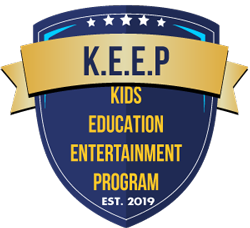Youth Comedy Edutainment Program
- Home
- / Youth Comedy Edutainment Program
Youth Comedy Edutainment Program
Youth Comedy Edutainment Program (YCEP) is a 10-week program that introduces youth ages 6-18 to the art of Comedy, where they learn fundamental skills associated with stand-up, improv, and sketch entertainment. In response to the national science, technology, arts, and math (STEAM) professional shortages, K.E.E.P uses this program to engage disadvantaged students, who would otherwise never identify with or consider careers in STEAM to envision themselves in these professions.
Comedy is a form of Cultural Arts with universal attraction. For this reason, the power of comedy and onstage performances has provided an unparalleled magnetism for metro Atlanta youth, motivating them toward STEAM education, where little or no interest existed before. The whole idea behind this cultural arts program is to use comedy entertainment as a gateway to STEAM for disadvantaged youth; helping them apply real-world relevance underscored by humor to increase academic engagement while making learning fun. We understand that we’re dealing with a generation of streetwise, tech and social media-savvy kids, so teaching and engagement has to involve much more than simply imparting knowledge. Imparting lasting knowledge involves creating a welcoming space and connecting with kids in meaningful and memorable ways, so they retain information, build on it, and use what they’ve learned to move forward in school, careers, and life.
Centennial Academy Faculty Testimonial
Our Impact
Why This Matters
A large body of neuroscience research confirms that humor systematically activates the brain’s dopamine reward system (Journals.physiology.org, 2017), and cognitive studies show that dopamine is important for both goal-oriented motivation and long-term memory (National Library of Medicine, 2017). Why this matters? Correctly used humor can be an effective intervention to improve academic retention in students from kindergarten through college. Also, the Society for Industrial and Applied Mathematics (SIAM) surveyed high school students nationwide in 2018 on how to increase student interest, understanding, and performance in math and STEM subjects. The results of the study showed that over half of responding students want teachers to be more creative in the classroom. While adjusting curriculums to add creativity may be a challenge for the K-12 educational system, this is not the case for community-based organizations, like K.E.E.P. We were established to correct imbalances in education attainment, and we understand that real-world relevance mixed with humor are the two ingredients needed to do that. We are also a nimble organization with the creative latitude to actualize our goals. As a result, our out-of-the-box comedic teaching methods, we have increased STEAM engagement and interest among thousands of disadvantaged youths in Atlanta since 2019.
Note: STEM (science, technology, engineering, and mathematics) and STEAM are often used interchangeable.
Humor FAQs:
- Humor improves student performance by attracting and sustaining attention, reducing anxiety, enhancing participation, and increasing student’s motivation for learning (Wayne State University School of Medicine, Detroit, MI APA study, 2018).
- Having a sense of humor plays an important role in developing self-esteem, learning to problem solve, and honing social skills (Kidskingdom.ca, 2019).
- Humor helps kids develop resilience, protecting them from mental health conditions like anxiety and depression (Kidskingdom.ca, 2019).
16 - Humor activates the brain’s dopamine reward system, stimulating goal-oriented motivation and long-term memory, which means that humor can improve retention in students of all ages (Edutopia.org, 2015).
- Reduced stress, anxiety, and depression
- Improved sleep
- Prevent heart disease
- Released endorphins—also known as the feel-good hormones
- Reduced stress hormones
- Lowered blood pressure and blood sugar levels
- Improved circulation
- Increased oxygen intake
- Re-energized body
- Relaxed muscles
- Massaged abdominal organs and improved functioning
- Improved digestion
- Strengthened immune system
- Increased tolerance to pain
- Increased smiling—which also triggers a part of our brain that boosts our moods
